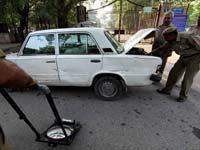Bomb blast victim denied trip to Canada

After four long and painful operations, Canada-based software consultant Nitin Mandlaus walks around with about 600 pieces of metal in his body.
He is one of the lucky ones. He survived the terror attack on the Delhi High Court in India on Sept 7, 2011 which killed 11 others and maimed dozens.
Now the 37-year-old man whose wife and young son live in Toronto faces another nightmare.
He can’t come back to Canada.
Not until doctors give him a medical certificate explaining the presence of the metal pieces in his body, including his skull.
The certificate is necessary for him to go through security screening processes at the airport and on the aircraft.
When Mandlaus approached the Canadian high commission, he was told by the officials that he could be arrested in Canada for the offence of possessing metallic objects with him, media reports in India said.
Doctors at the Ram Manohar Lohia (RML) Hospital, where Mandlaus was treated, say they do not have the legal powers to issue such a document.
"It is snowing heavily in Toronto and my wife desperately needs me. I must be with her. Yet here I am, with over 600 shrapnel in my body. The doctors at RML have extracted about 200, but say removing any more can risk my life," said the MBA from Delhi who went to Canada three years ago.
Even doctors and NGOs say that the problem of Nitin Mandlaus is unique. "Nitin cannot go to Canada since he will be arrested for possessing metallic objects with him.
“This has been made clear to him by the high commission officials. They told him only a certificate from a senior medical practitioner stating the exact chain of events and his medical condition can earn him an entry into Toronto," said Ashok Randhawa, president of the South Asian Forum of People in Terror.
Randhawa claimed representations to both Delhi government and the union health ministry had not got them any favourable response.
RML hospital authorities said they "needed time to study the case before making any comment". A doctor, who did not wish to be named, said such a certificate could put a medical practitioner's credibility to question.
"Nitin has several shrapnel still lodged in his skull, neck, right leg and arms. Prima facie, we believe he can lead a normal life, but he still feels pain and cramps. But a certificate cannot be issued because if there are complications later on we could be taken to task for allowing such a patient to travel," said the doctor.
The shrapnel in his body isn't the only thing on Mandlaus' mind.
"Much as I worry about my child who has been missing his classes since September, I have to also take care of my father.
The media reports has prompted the Delhi High Court to issue a notice to the central and Delhi governments for denial of a medical certificate to a non-resident Indian victim
The division bench of Acting Chief Justice A.K. Sikri and Justice R.S. Endlaw sought a status report from the two governments this week.
The Delhi court bomb attack last September left 11 people dead and at least 90 injured.
It was the second time the entrance of the court had been bombed last year, and the eighth terrorist attack in the capital of New Delhi in just over a decade.
An email purportedly from Harkat ul Jihad Islami (HuJI), a terrorist group based in Pakistan and in Bangladesh, took responsibility for the attack. The email warned that attacks on Indian courts would continue unless the death sentence against a former Kashmiri insurgent involved in an attack on India's parliament in 2001 was repealed.
The improvised explosive device was placed in a briefcase outside the court's main gate near the reception centre, where scores of people had queued for visitors' passes. At least 200 people were present when the bomb went off on that Wednesday, a day of the week where the court accepts public interest litigation.
Leave a comment









